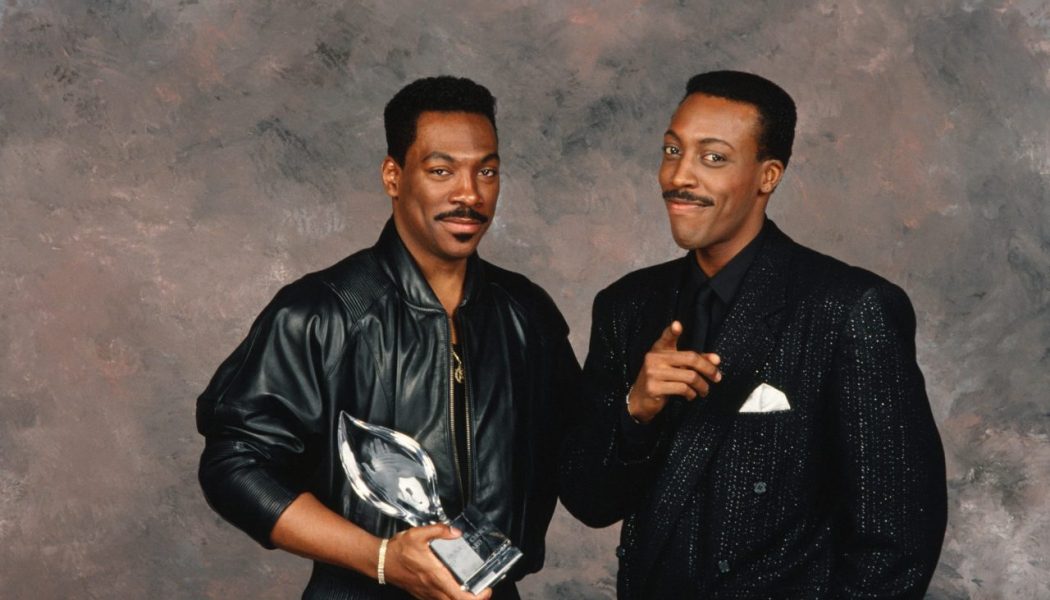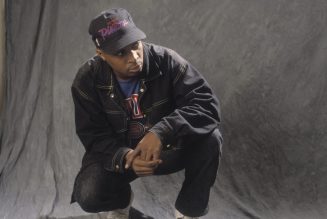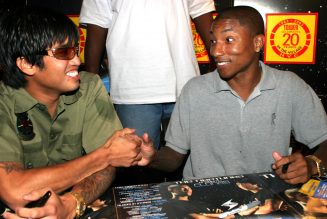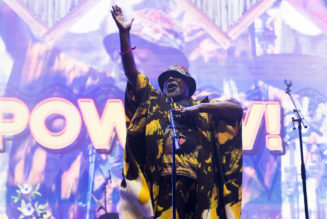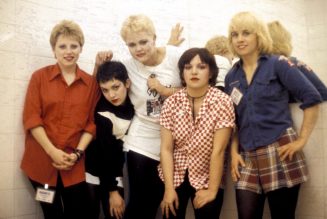This article originally appeared in the October 1990 issue of SPIN.
In the five years I’ve known Eddie Murphy, this interview was our first opportunity to site down and talk for any real length of time. Whose fault is it? Both of ours—we were too busy, too far apart, and too, too different (so we thought). After finishing, we were two young African-American males from Brooklyn.
SPIKE: This is gonna be painless. Some of these questions I know the answers to already, but we’re just not going to assume anything. So the first question is: Why do you think we haven’t worked together yet? People always come up to me and ask me, “When are you and Eddy gonna hook up?”
EDDIE: I don’t know. This weird thing happened, and I don’t even know if it’s something that people do consciously. What happens is a bunch of separate camps and shit. There’s the Spike camp, the Eddie camp, the Keenan camp, the Robert Townsend camp, and everybody’s off doing their own shit so nobody is collaborating, so it never happens. And it’s stupid.
I’m looking forward to the day when we do work together. I think that one of the good things that could come from this interview is that we can clear the air. Like I said before, people always coming up to me and say “So what’s up between you and Eddie?” And I say, “Nothing!”
I know that people ask you that too, because in the past we have said a couple things about each other, but I think that’s in the past. Because for one thing, I never said that you and Bill Cosby should be shot for not living in the ghetto. That was a big brouhaha. But the thing that really did it was the Los Angeles Times article, that series on Blacks in Hollywood.
I said of you said? What’d they say?
Both of us were in it. I know I’ve been susceptible to this, where I’ve taken some bait I shouldn’t have taken. Am I gonna take the bait and say something derogatory? That’s what was really behind that article. At Do The Right Thing, the L.A. premiere, we both went over in the corner and talked. And you asked if I said that thing about you and Bill Cosby, and I said, “No, everything’s cool.” And the next day I’m on the Arsenio Hall show, and he tried to assassinate me. I said, “What are you talking about? I saw Eddie last night at the premiere, you know, everything’s cool.” But everybody was talking about that. Did you see it?
Arsenio attacking you?
Yeah. Because the way it came up to me was like he was defending your honor. And I didn’t think it was a case where your honor needed to be defended. He was bringing up stuff from eight years ago, like, “What about you and Whoopi and blue contacts?” I said, “C’mon man, that’s old, me and Whoopi are cool, that shit you’re talking about is old.”
What was he defending about me that you had said? I forget.
I don’t remember exactly. I just found it strange that me and you, the night before, with every difference we had, we settled, and the next night on national television he was jumping all over me. Both of us have been slammed for our portrayal of women and gay people in our films.
Have you gotten slack from gays?
Yeah. School Daze. The frats, the fellas were stepping, gamma, gamma, f-g, f-g, gamma gamma f-g f-g.
Oh, man, that was funny.
They still called it homophobic. I mean, as far as criticism goes, do you listen to it? Do you pay heed, or just say, Fuck ‘em, they can’t take a joke? In particular, sensitive issues like homosexuals and lesbians and women.
Well, I haven’t really been the recipient of much anger from the gays recently. My stuff with the gays was behind Delirious. I said something about AIDS. I said something so long ago that people don’t even remember what I said. A lot of people don’t understand that when I said what I said—back then—I was 21 years old. And it was a new disease and nobody understood it. And now I am a man and I know it’s a much more sensitive issue, so I wouldn’t even joke about it.
But as far as doing a joke about a gay person—gay people are people just like everybody else, and I’ll do jokes about anybody. If I think that something is funny, I say it. And I listen to criticism when I think that someone is being objective with their criticism. I can tell if someone’s criticism is rooted in envy or if someone’s criticism is rooted in the fact that they just don’t like somebody. And I don’t take heed of bullshit like that.
Do you read all your reviews?
Uh, yes.
What do you think about the critical response? We were talking about this on the phone. The way I see it, they only want one Black person at the top anyway, and even though you’ve made two billion dollars for Paramount and Hollywood, I still think they’d rather have somebody white in that position. And any time there’s a white boy that comes around that might take the title from you, like Tom Cruise or whoever, it’s like, yeah, yeah, yeah, take it from Eddie.
But as far as the critical response to Another 48 Hrs., I thought the movie was alright. And after doing a picture that was received both commercially and critically as fucked up as Harlem Nights was [laughs], after doing a picture that was viewed as a shitty movie, I should have done a movie that was great as opposed to a movie that was alright. So the criticism for 48 Hrs., I didn’t freak out and go, “Oh no, they’re fucking me over and they’re just coming after me ’cause I’m Eddie.”
You know when I felt like that? When I did Coming to America, ’cause I felt that was a really good movie and it got really bad criticism. It was like, Well what the fuck do they want me to do, you know? But this movie I think was an okay movie, I mean we got some bad reviews and we got some good ones. I didn’t expect it to be like, either or.
Now that you mention Harlem Nights—for me, Eddie, one of the most hardest scenes for me to ever watch was when you had that fight with Della Reese.
Hard or it was funny?
I didn’t think it was funny because with me, when I saw Della Reese I saw my grandmother, I saw every old Black woman I know. And no matter what any old Black woman would do to me, I don’t think I would ever punch her in the mouth or shoot her toes off.
Okay.
I just wanted to say that.
Oh, okay. I thought it was a question. Did you ever hear an old Richard Pryor album called Craps (After Hours)? Della Reese’s character is based on that character, Kiss My Ass, Big Bertha. She’s this madam that works in this place, you know, and—
But, Eddie, for me, when you see Richard Pryor talking about various characters, that’s one thing, but when you see it dramatized, you’re like, rock’em, sock’em.
Did you see it in a movie theater or a private screening?
I saw it in a movie theater.
And was the audience full?
Yeah it was full.
And when I had the fight scene with Della Reese, were they screaming, laughing?
Yeah, they were laughing.
There you go. It was a comic moment. Wh’s to say that you can’t hit a woman in comedy? it was a joke.
I just saw my grandmother up there.
It was a comic moment. You didn’t laugh at all at that fight scene?
I did at the beginning. But then it didn’t become funny anymore.
They screamed throughout the whole scene. Throughout the whole scene, they laughed at that. The joke was, I got my ass whipped by this old woman. That’s funny. See, when you’re talking about comedy you’re talking about apples and oranges. So when we did that at the test screening, 50 percent of the people would go, “The funniest shit I’ve ever seen in my life was when you fought Della Reese,” and 50 percent of the people would have the reaction you had: How could you punch a woman in a scene? But I thought it was funny.
What is your fascination with Elvis? I don’t know any Black people who like Elvis Presley.
Well, that’s a good way of putting it.
I mean, people are gonna like who they want, but as I sit here and see that picture of Elvis looking at me—
For you to understand Elvis you’d have to—what’s a good way of putting it? Elvis has more presence than any entertainer ever. When he was there he was there. One of the things that’s fascinating to me about Elvis Presley is that if you look at him he looks like he’s totally i control of everything, but beneath that, he’s totally out of control. I think that’s fascinating.
When’d you start digging Elvis?
I don’t know if you can say it’s “digging,” like I’m a fan. I think he’s a fascinating person.
You don’t got no wing in your house dedicated to Elvis Presley, do you?
I have a room with some Elvis pictures in it. I have a room with lots of pictures of Elvis.
You ain’t seen him yet.
No, I heard all that stuff about “the only thing they can do is shine my shoes and buy my records.” I heard all that stuff. And I’m not like “Oh, fuck that, I love Elvis anyway.” You know, I’m not coming from that kind of trip. In terms of his whole thing, he was fascinating. You don’t like Elvis Presley at all? You don’t find him fascinating?
I wish he never died myself, so I wouldn’t have to hear about him every single day.
You know what’s interesting about Elvis? When he was getting ready to die, Elvis was broke, wearing big platforms as was like a joke in show business. It shows you how fucked up society is, ’cause in the movies they only want happy endings and shit. What happened is, when this man died, that was their happy ending. Elvis was their American dream, the poor boy that got rich and they hated him for it. And then he died and they turned him into this god form. And I think that’s fascinating.
Did you ever see him perform?
No, never.
You got all of his movies on tape? Which one is your favorite?
I don’t have a favorite Elvis movie. I don’t have a favorite Elvis record.
How do you choose a script, Eddie? And why’d you do Another 48 Hrs.?
Ultimately, Another 48 Hrs. was my idea, and the story that we wrote was under an alias in the movie, because I wrote the story and I didn’t want any more bullshit. If they would’ve seen “Story by Eddie Murphy” and Paramount just went through this big thing by Art Buchwald, it would’ve just given the critics s something else smart and snide to say, so I went under an alias on the story credit.
Did you find that accounting by Paramount very amusing?
I’m not learning anything from that whole thing by Paramount and Art Buchwald, because I knew that’s how they did shit. Everybody that makes films knows that’s how they do shit.
I know, but this was the first time a movie company ever really went public—on public record—[about] the accounting for a movie.
You know what I thought was amusing was that both parties were trying to make it look like the reason there were no profits was because Eddie Murphy got paid so much money. That was funny. Stupid shit like that. Like how many people work for me, or what car I drive. It’s like I’m the only actor in Hollywood that has a Ferrari. There’s lots of actors in Hollywood that have much better deals than me and driver nicer cars than me and have more money and all that shit but I was the whipping boy.
Well, how could it be that the white boys in Hollywood are making more money than you but they have not made films that have grossed over two billion dollars?
I got into a multi picture deal with Paramount and I owe them “X” amount of pictures for “X” amount of money. And what happens is, I can renegotiate, but ultimately Paramount can say, “Look motherfucker, we got a deal so get the fuck out of our office; you can’t go and say I want blank and blank.” When I made my deal with Paramount, it was a good deal at the time, you know. So I’m not sitting around crying and shit. But I know when I finish my two pictures I’ll be in the open market. But I can’t come up with no idea for no movie. I’m not a very disciplined writer. I’m good with conceptualizing but I’m not good at writing scripts and shit. And I also don’t like the process. I like to perform and be an actor, I don’t like all that other shit that y’all do. Y’all can have it, and you do it wonderfully. But if you’re on the open market, you’ve got all these studios and it’s a wealth of talent you can go to. But Paramount ain’t slavin’ me off and shit. But I could be in a lot better position than I am now.
How is your relationship with Paramount?
It’s cool; it’s cool.
One of the biggest philosophical differences that we probably have, Eddie, is what you can do and what you can’t do. I’ve read several times that you’ve answered me saying, “I can’t tell Paramount what to do, it’s their house.” Now it’s my opinion that, if anybody brings them two billion dollars—
I agree. I agree.
Then it’s your house also.
I heard what you said before and I cannot go into Frank Mancuso’s office and say, “Look here Frank, I’m not doing anything else until you hire some Black people.”
If you did that, Eddie, they would have to do it!
No, they wouldn’t, they would say, “Get the fuck out of here.” They would not do it.
I’m not going to say which executive, but there’s somebody I asked this question to. I said, “If I were on the caliber of Eddie Murphy, on the level of Eddie Murphy, and I went to you and I said, ‘Look, motherfucker, tomorrow I want to see ten capable Black motherfuckers here at this studio,’ what would you do?” And he told me, off the record, “I would have to hire them.”
Yeah, but ’cause a brother told you that, that means it’s true?
Sometimes I think you underestimate the power that you have.
I have made personal demands, and they say, “No, Ed, we’re not doing it.” So how can I go in there and say, “I said, you are going to hire these people!” They would say, “Get the fuck out of here.”
They got no Black people there?
If I weren’t in a position where I owed Paramount Pictures, I might be able to say, “If you want to be in business with me, then you have to do blank-blank-blank.”
But that’s the same approach as affirmative action. These companies, they have no contracts with the United States government. If you haven’t got a certain amount of Black people working on this motherfucker, you ain’t getting no government contract.
But I already have a contract with the studio, I owe them two pictures. Ultimately they can say, “Get the fuck out of my studio, you owe us two pictures.” Ultimately they can do that.
If there are to be any changes though, I think that the only way we would do it is with people like yourself, me, and Bill Cosby—use the little clout that we can. Because they ain’t gonna do it on their own, will they? Let me give an example. There was an article about agents in the L.A. Times, and they asked me how come I didn’t have an agent, and on and on. And I said, “I went down to the CAA the other day and there was one Black agent, that’s it.” And three people called me a week later and said they hired four more Black people just because of what I said in the fuckin’ L.A. Times! Because they’re sensitive, because the shit was in the press, in the media.
Black people hire Black people at Paramount. Because I’ve hired a lot of Black people in my company, you know, so give me a title.
All departments—marketing, distribution. I ask Tom Pollack this all the time. We were lucky they just hired a Black woman in publicity. He says, “You’re right. We have no Black people here. We’re trying to develop a program”—or something. Those days of saying you can’t find any qualified Black people are over. You just present him with a stack of resumes—boom. Start interviewing motherfuckers. Because if we don’t do that, then they’re going to keep that shit lilywhite as long as they want to.
See, I don’t want to take the position—I’m sensitive to the issue too. I’m just sayin’ it ain’t easy as that. It’s easy to say, “Well, he’s just in a position to do that,” and then say, “Well, why isn’t he doing this and that?”
I know what you’re talking about Eddie. I know it’s even more so in your case. But people look at me like I’m the Black—every young Black filmmaker in America writes me every single day wanting me to give them the secret of how to be a filmmaker. That burden shouldn’t’ be put on me, you, or any individual.
Here’s what the deal is more than anything. I know because of the level of my celebrity that I have been forced—I am being forced—to be a politician in a manner of speaking. And what happens, although I know i have a responsibility politically, ultimately I am an entertainer, I am an artist first and foremost. And you accept the responsibility, but the artist part of you resents the fact that they don’t just give you the freedom to just be an artist. But you can’t just look at the script and say, “I want to do that.” Every time I do something I gotta go, “What are they gonna think if I do that?” It becomes this giant—
You know what you’re talking about, Eddie? That’s the dilemma that Black artist are in, because we’ve dogged out in the media for so long that people become so sensitive that they want every image of Black people, whether it be a book or play or movie, to be a hundred percent angelic, a hundred percent positive, but tat isn’t truthful. I get that all the time: “Spike, how come you never have any positive Black people in your movie? People on the corner pissing and cursing and using profanity—don’t you know we have Black doctors and lawyers—”
Do people say that to you?
All the time.
I’ve never read that in the press from white critics. They always praise you.
No, that is not true, Eddie. They don’t always praise me. Before Do The Right Thing came out, they wanted to hang me. They said, “That movie is going to cause ten million Afro-Americans to go berserk and riot all across the country. They had my ass on fuckin’ Nightline, the night the movie opened.
Let me get a good way of putting it. If I had done your movies—you got pretty positive reviews on the first movie—
She’s Gotta Have It. So-so on School Daze. The best for Do The Right Thing.
Now if I had done the movie, me, do you think I would—it would—have gotten positive reviews? The exact same picture?
That being your first film ever, or being Eddie Murphy?
Me being Eddie Murphy and doing that movie.
I think you would have.
See, they would have attacked all the negative stuff in the movie as opposed to the filmmaker: “Spike, you’re just perpetuating the myth that all Black women want to do is fuck.” That’s what they wold have said to me if I had done the movie.
They said that shit to me anyway, Eddie!
There wouldn’t have been no good reviews. What’s happened with me is what you said a little while ago. They haven’t had a white heavyweight champion in years, the most popular person in music is Black, and I’m in the position I’m in—they can’t stand that. They can’t. So what they do is they come at me any way they can possibly come at me. Then on top of that you get these Black people, it seems like they turn on you.
People do turn. I remember the night that you came to see She’s Gotta Have It, because at Cinema Studio we saved the whole row. Eddie, this is a good thing that we’re talking about, because remember the time I said I wanted to get a group of us all together, and it never happened? I said, “Let’s get me, you, Michael Jordan, Mike Tyson, Magic Wynton Marsalis, Branford Marsalis, you know, people like that, people of that caliber, all the young brothers out here doing something, and try to collectively do something.” I think that would be a tremendous thing.
Even if we didn’t do anything. I think it would be—
Because I think Black people aren’t the most unified people on the face of the earth. We gotta get everybody’s schedule together.
Everybody says it’s cool, but the shit doesn’t ever come. You got these different camps. Our people, like you said, are the most divided race of people on the face of the earth. But that’s something that was done to us. It’s something that’s inherent, from back when we were slaves, where they’d see a group of people, slaves together, they would break that shit up. Now when a Black person gets a little something, they shoot off in the corner and say, “This is mine. back the fuck up.” We are so afraid of losing our shit that the idea of getting together is scary. It’s inherent, it’s not even something you’re doing consciously.
This is how scared white people have Black people. I was sitting in my office with Mike Tyson and Don King—my office, at Eddie Murphy Productions. The only two people that work there that are white are my managers that work for me. And we got on the subject of white people, and the government, and shit like that, and what happened is, we stared whispering, “The white man…” They got you so scared you whisper in your own house about that motherfucker.
Now that’s a helluva thing. Me, Mike Tyson, and Don King, sitting in my own office whispering about the white man. I said, “you, man, they have done such a thing on us that we whispering and he ain’t even here.”
And that’s just something that’s in you naturally—what the fuck is up? And you don’t know when they’re listening or when they gonna get you. So what happens is Black people reach a certain level of success and what happens is you get your own little group around you, your own people around you, and you start to live this xenophobic existence. you are cut off from the rest of society and you have your own little world and the idea of sacrificing that is scary to a lot of people, ’cause a lot of people aren’t in the position where they can bounce back if they lost all that shit.
The scariest thing about you to me is—is that every Black person who really stood up and said, “Fuck it, I’m about this,” got dissed, killed, fucked over—everybody, from Dr. King to Ali, you know? It’s like, they fuck you over and shit, so my think is, I commend you on that—that you say, “This is what my shit is about, you know?” My politics are much more covert. I am very Black and I have a very strong Black consciousness but I am about gradual change and dialogue that is much more civil.
Then what’s my approach, Eddie?
Fuck this shit, fight it, kiss my ass and I don’t give a fuck and fuck you. I’m like, goddamn, go ahead, brother.
We should make our list and divide that shit in half and start calling brothers. Serious.
If me and you were the only ones there, that’d be better.
Some people will show.
First of all, the people that are movers and shakers—young, Black, strong, smart—I don’t know, man, that fear shit is in there, ’cause I’m bound to go—
That’d be good, Eddie—to just talk about that shit, though. We don’t have to announce that shit, we could take this out of the interview. But just get everybody together—Las Vegas, three-day weekend retreat. And say, “Look, we are young Black men, young Black males.” Our chance of living beyond the age of 25 is some crazy percentage. All of use who are on drugs, who got AIDS, who dropped out of high school, who are giving sisters babies left and right, we have a disability. And me, you, Michael Jordan, Mike Tyson, Magic—that’s gonna be crazy. It would take a sacrifice—that’s the word—because motherfuckers are gonna be like, “Well, I got a movie to shoot,” or, “Well, we’re going into training camp.” I want to be positive and say that the people who are really down will make the sacrifice, because this is the time to do it. Motherfuckers, little kids shooting Uzis and shit, 15 years old, that shit is crazy. Eddie, you were born in the wonderful borough of Brooklyn, New York. I know a lot of that is in Delirious.
In Greenpoint Hospital in Brooklyn.
“You want some ice cream? You’re on the welfare, you can’t afford it.” What age did you move to Long Island?
When I was ten.
So you lived in East New York?
I had to stay on the block, you know. I was only a kid so I don’t have much memory. I can tell you about that sidewalk on the block, but that’s about it. The sidewalk was cracked in front of Bobo’s house, but there ain’t much to talk about.
We’ll go on to the next question. What film do you think you’ve done your best work in?
Coming To America. As an actor, yeah, I think so. There’s a scene in that movie—I read a review of the picture where they go, “There’s a scene in the movie that is so confusing. Eddie Murphy is playing four characters in a barber shop and it gets so confusing you don’t know who he’s playing or if he’s playing any at all.” It’s like, you cocksucker. You told me I was gettin’ so busy you didn’t know who the fuck I was doing in the scene, and they tried to make it like it was an insult.
Eddie, you, Bob DeNiro, myself, and Little Stevie sponsored this thing—United Artists Against Apartheid benefit for Nelson Mandela—it was great, we we’re right there when Mandela walked in. And you were the first person he saw, and he walked up to you and he hugged you, and he said, “Eddie, you have given me many laughs in prison.”
That, to me, is gonna be the greatest compliment you’ll ever receive. Mandela was in prison for 27 years and your films—your comedy, made it easier for him to endure his imprisonment. You make people laugh. This is a great talent. Comedy is needed.
That’s why my politics have to be different from your politics. But ultimately, I think we have the same views on things, we just have to approach it differently.
Like that picture over there of Malcolm [and Martin].
I think we agree on most things; I just have to have a different approach because—I’ll give an example. My house is bugged, my phones were tapped, my bedroom was bugged and all kinds of shit. And that goes with Jesse Jackson coming to my house—relatives and Minister Farrakhan come to my house. When Minister Farrakhan comes to town, I have the FBI watching my house to see who goes in and out of my house and shit. And the reason my house is bugged is because I got these political—these Black leaders that come and they talk to me.
Now, what the government does is, they do Gallup polls: Who is the most popular Black amongst the youth?—and it’d be Eddie Murphy, Michael Jordan, and Bill Cosby. And it’s like, “Okay, you got three n—–s and the Pope coming together before the President,” and all that shit and they look and they say, “Well, who is dangerous? Now, Michael Jordan is an athlete and he is in the United States. Bill Cosby does lots of stuff for Black people, but it’s a different type of Black person than when you can remember getting a foot in your ass or getting sprayed down with a water hose. he’s a different type of Black person than the Black person who saw it on television.” If you were there, you’d be afraid of it, and if you saw it on television, it’d make you angry.
It makes you angry when you see it. They say, “Okay, if this person wants to decide to become a crazy radical political person, going against the grain, he’s potentially dangerous,” because my films go all over the world and I am a comedian. So it’s like, doing comedy I can get a message across being funny, and, on top of it, everybody’s going to go see my shit. That’s why I have to be different, that’s why I tiptoe through my shit. Ultimately, I could get dissed.
I don’t think you can beat the system. I think the thing you have to do is be successful within the system. And to get our just due.
Well, that’s something I learned, but like you say, people have to arrive at their own pace and the way they want to approach things. That was a great moment, when Mandela went straight up to you and told you that. He must be smuggling those tapes in the prison, huh? And Dinkins gave you a fucked up introduction, huh?
Well, what Dinkins was doing was being a politician. It’s like, I’m perceived by a lot of people as being a misogynist and homophobic and being all these things, and in the meantime he’s the Mayor of New York, when all these things are on the front page right now, so in introducing me and being a politician and making apologies for something that didn’t warrant being apologetic about. I tripped on the fact that I connected with Mandela, you know?
You said, good-naturedly, “What kind of introduction is this?”
“Well, you can’t go by what you see.” I’m really gonna come off bad in this thing.
No, you’re not, this is great. Let’s talk about your short-lived directing career—Harlem Nights. Why’d you want to direct?
I had just been procrastinating doing it for like, three, four years. A lot of it came out of frustration, because what’s happened with me is to find really good directors that want to work with me. It’s really hard. Usually I get a schlepper director with maybe one or two hit pictures, but that’s not really an artist. I’ve had directors I like—I like a lot of directors I worked with—but I think I’ve had maybe two artists, and the rest of the guys were like, “I’ll do this Eddie Murphy movie and get paid” and shit.
So rather than getting the schlepper—first of all, I’ve wanted to do something with Richard Pryor for years—rather than getting a schlepper, I said, “Well, fuck it, I’ll just do the shit myself.” And the biggest problem that I ran into is the biggest problem I have as an entertainer period, is that you get to a certain level—we had this discussion the other day—where people will not say, “Yo, man, that’s fucked up, don’t do that.” So what I did was I said, “I’m gonna get Eddie Murphy and Richard Pryor and Redd Foxx in a movie that’s really not a comedy.” It was the first time I had written an all-out screenplay.
There were just too many different hats to be wearing the same time for the first time. It wasn’t a pleasurable experience. I just wanted to direct—just to see if I can do it. And I found out that I can’t, and I won’t do it anymore. And the biggest thing is I didn’t enjoy doing it.
The problem with Harlem Nights wasn’t the directing as much as it was the writing of it. It was just written fucked up, and that’s because I threw it together real quick. And then it was disappointing because Richard wasn’t the way I thought Richard was gonna be. I thought it would be like a collaborative thing where I would get to work with my idol, and then it would be like, “This is great.” But Richard would come to the set, say his line and leave, it wasn’t like a collaborative thing.
He’s not himself—
Well, Richard doesn’t like me. That’s what the whole thing was about.
Have you ever said this before on record?
No, and I didn’t know it until after I did the movie with him. There’s this thing where Richard feels that the reason his shit is the way it is is because I came along and fucked his shit up. He really believes that in his heart.
You’ve done nothing but pay homage to him.
Yeah, but the only reason he did the movie was he got a big payday out of it, and trust me, the brother does not like me. And I used to have more Richard Pryor pictures up than Elvis Presley. And after I worked with the brother and I found out shit, and you meet people that are around him, know him, and the two camps meet, and people start talking, it’s like, Oh shit. And it’s real weird to find out your idol hates you and shit.
You really think he hates you?
I don’t really think he hates me; I just think he things I’m the reason why his shit ain’t the way it used to be. And I ain’t, ’cause I idolize the guy. I found out he used to go to the comedy clubs and I’m going as a student, because in standup comedy, there’s few people that I can go and learn from, you know, ’cause he’s like a master. You know? Do you think your phones are tapped?
I think so.
But you know what, all they want is just to listen, and if my phones are tapped and my house is bugged, they just want to listen and know what you’re talking about. They just want to listen: “Where’s this motherfucker’s head at? What’s he planning?”
FBI: “We don’t know where we’re gonna have the meeting yet.” CIA: “We’ll let you know.” Who’d you have come in and sweep your house, a surveillance company?
Yeah.
And where was the bug?
I could just be paranoid—who’s to say it was the fucking government? It could have been Paramount. I don’t know. It could have been anybody. It was one behind this wall—it was voice-activated with a two-mile range on it. I held it in my hand. Then there was one in my bedroom—here’s the scary thing.
In your bedroom? That’s just like you’re Dr. Martin Luther King.
I have a joke about that, ’cause I’m working on my standup and I got it in my routine. It’s one of those jokes that Black people gonna be like—”That’s fucked up.”
So your bedroom was bugged?
Here’s the real scary thing. After they took the bug off—24 hours after—it was replaced. They swept the house, took everything down, and they reswept. And it was back up. We had some new people on staff at the time. It could have been a maid, it could have been a florist, it could have been anybody, you know? That was the scary thing.
That’s scary—people you hired, on the FBI, CIA payroll—
Who’s to say what it is? I would get mad when I would read stuff you would say and think, The brother don’t know that I got so much in common with the brother, it’s just I gotta have a different agenda because more eyes are on me. And I can potentially get fucked up if I say something. It was like, damn.
How come we never just talked to each other?
What they like to do is to separate. You’re the biggest Black director in the world. Okay, I’m the biggest Black movie star in the world. That’s a dangerous combination to have us hook up, ’cause the people who have control don’t have control then. If Harlem Nights had been as good as The Godfather it would have still been received bad because it’s too much shit—it was like, fuck that, I am directing my shit, I am producing my shit, I am writing and acting and starring—all control was taken away from then.
I think you got tremendous pressure on you, Eddie. Because every time you open your mouth, people want to laugh. And that’s crazy.
And they want it to be as funny as the last time I said something.
Or when you were on Saturday Night Live eight years ago. I mean, that shit’s very stifling.
And they—there’s probably a group of people that love my films, but—it’s usually industry people—
You think you’re not well-liked amongst Hollywood?
They don’t know me in Hollywood. I don’t think I’m disliked. No one knows me. I’ve done every movie at Paramount, but none of the other studios know me at all. I don’t do the Hollywood scene, I don’t go to Streisand’s house and that kind of shit. When I go to a club, I go to a straight-up club that everybody goes to. So they don’t know me in Hollywood, and their thing with me in Hollywood is, What’s with this guy and shit? This arrogant, young Black motherfucker who don’t come around, don’t do no press. So the press is always on me because I’m inaccessible and they can’t figure me out. All of their great ones, the ones they perceive as great, they had meetings with. What happened with Mike Tyson is you get so big people don’t understand what happened—how can this motherfucker never lose? With Mike when he lost and became human. And in retrospect, I think doing something like the last two films I’ve done, maybe it’s good that it makes you lose a step. Because what it does now is makes you human again and the pressure is off you to be this perfect motherfucker again. Because I was always knocking the ball over the fence and I hit a double—my other shit was all home runs. Guys like Mel Gibson, guys like Arnold Schwarzenegger, their movies do what Harlem Nights and 48 Hrs. are doing, all the time. And they’re big stars, but I just did one or two pictures like that, and it’s like, that’s it, he’s falling off.
But when you do that it takes the pressure off you and it gives you the drive to get your shit back. Because I was probably getting comfortable with my position and I was not appreciating the position I was in. I went through a thing where I had seven pictures back-to-back—hit pictures. And nobody had done that and I think what happened to them was, it was like, What is up with this n—–? I met with Brando about three years ago. Just very bizarre. It was at his house. I think he just wanted to look at me and talk with me and see what was up. Not like, What’s the secret or whatever. Just pick my brain. Warren Beatty did it and Charlton Heston did it. They just want to meet you and pick your brain, look at you, talk to you. What is this strange n—–?
When was the last time you talked to Michael Jackson?
I talked to Michael about two months ago, three months ago. I mean, I love my brother but that is one strange—I think he had a really normal childhood as far as his family goes—what he did for a living is one thing, but his parents seem like normal people. People are constantly pointing a finger at him, going, “Look how strange he is,” but given Michael Jackson’s popularity, and given how long he’s been in show business, the brother is normal man. That motherfucker is the most famous—no one can comprehend what it’s like to be the most famous person on the face of the earth. That motherfucker is the most famous person on the planet. There’s not a place he can go, there’s nothing he can do—no one can comprehend what that’s like.
What happened to the alleged “Black pack”?
What Black pack?
I knew you were going to say that.
That whole thing about the Black pack, that was a joke. We were sitting at a press conference and Arsenio said, “Right now there’s a resurgence of Blacks in Hollywood, and there are lots of Blacks that are doing things; we’re here doing our own thing now.” And as a joke I said, “You know how y’all got your brat pack? We’re the Black pack,” and they got a big laugh.
Then it turned into like I was really on a committee. That’s a misconception. It’s exactly like I said it was: It’s camps. And Arsenio is my best friend, but he even got his own camp now. And there’s nothing wrong with that, if people aren’t opposed to collaborating with each other, ’cause the white boys got their own camps too. Spielberg worked with Lucas, and Ron Howard worked with Spielberg.
So that we haven’t worked together, that’s slave mentality, huh?
It’s just in your head and shit. But it’s not something that we did as much as—
But we’ve got to overcome that.
What the press did successfully up until now was—because in the public’s eye, me and you don’t like each other. What they were trying to do was make us not be down, because they don’t want that, they don’t want something collectively happening. Because there’s strength in numbers, and by yourself you can do but so much, by myself I can do but so much.
But everybody doing their own thing, you can only get so much accomplished. They would love, love, love for me to do Beverly Hills Cop 90 and just keep doing it, and then they’d look back at my shit and say, “All Eddie Murphy did was fluff. All he did was bullshit where he took a gun and did the laugh and jumped over a truck and all that bullshit.”
And they would love for you to do movies of substance—like you do—and make twenty, thirty million dollars a picture, you know? But if you got me, who is capable of getting busy with any actor—I don’t think there’s an actor in the town who can blow my shit away, and then hooking up with a director who has depth—because when white directors look at me they’re not going, like Scorsese and DeNiro, when they get together there’s like explosions and shit, you know?
But a director like you and an actor like me who have the comic talents that I have and the talents you have in terms of writing and depth and your overall vision, that combination is potentially mind-blowing to motherfuckers. They’ll let you achieve that little personal shit, because what you’ve done as a director is something personal, a personal glory. And what I’ve achieved as a director is something personal. But if we did something that was collaborative and it came off, that’s a greatness, that’s historic.
Well, I’m ready.
It’d be fucked up if after all this shit we talked about, we do a fucked-up movie: “Remember that SPIN interview? That movie was bullshit.”
I appreciate you letting us do this. I look forward to when we work together. It’s gonna be a motherfucker. I know people will come. It’ll be good though if we finance the shit ourselves. We won’t even go to a studio. We’ll show it to each studio and let them bid on it. Don’t even go to them for financing. That will really fuck them up. A good distribution rate too, not that 35-percent bullshit. Gross, from dollar one.
That shit be monumental. See, I’m an entertainer.
But you got the capital, though.
I think about performing all the time. There are lots of business ventures I’ve never gone into because if you go into business you’ve got to have the head for it, you’ve got to have some commitment to it, and I don’t think I would give a fuck about no theaters, my theater shit would be fucked up.
When we’re on that level, we can just merchandise. That’s where the shit really comes when we start controlling shit. We can’t really call the shots until we own the theaters, own studios, own banks, own businesses. That’s why this whole Korean boycott thing, all that energy that people spent boycotting, it was only about a month ago they said, we’ll start our own vegetable stand.
You know what’s real frustrating? You got to keep in mind all the time that they are 50 years ahead of us in terms of what they have planned for us, so you’re always fighting uphill. Like the whole Civil Rights Movement, but there was a downside to the Civil Rights Movement in that the Black entrepreneur is gone now, because back then you had Black bus companies and Black restaurants and Black hotels and all that shit. All the Black businesses closed right up. And that was calculated. The Civil Rights Movement was about integration, it was about economics, and people think that, Fuck that he’s a n—– if his money is green, and they integrated society, and now there’s no Black entrepreneurs. There’s one Black business in the Fortune 500. That’s a fuckin’ joke. They’re 20 years ahead of us, 50 years ahead of us, thinking like that. That’s not just something that happened by chance, that’s calculated.
This is historical, you watch.
I’ll probably get killed for doing this shit. FBI snipers put a bullet in my brains, I’ll find out my taxes are fucked up, and I got two dollars left.
I keep my taxes tight because you can’t slip up, man. Just like Marion Barry, man. How you think you can be smoking crack, a Black man, and think you ain’t gonna get busted for that? A mayor, smoking crack.
My thing with Mario Barry is I feel bad for the brother and I sympathize with him as a human being, but I can’t even go give the brother support. I see a video of you smoking crack, you my brother and all, but you have to face the music. The brother let his guard down—but ’cause you’re Black you can never let your guard down. And please don’t make me look like I’m some kind of Roy Innis in this fucking thing. I’ve never played devil’s advocate about any interviews—
